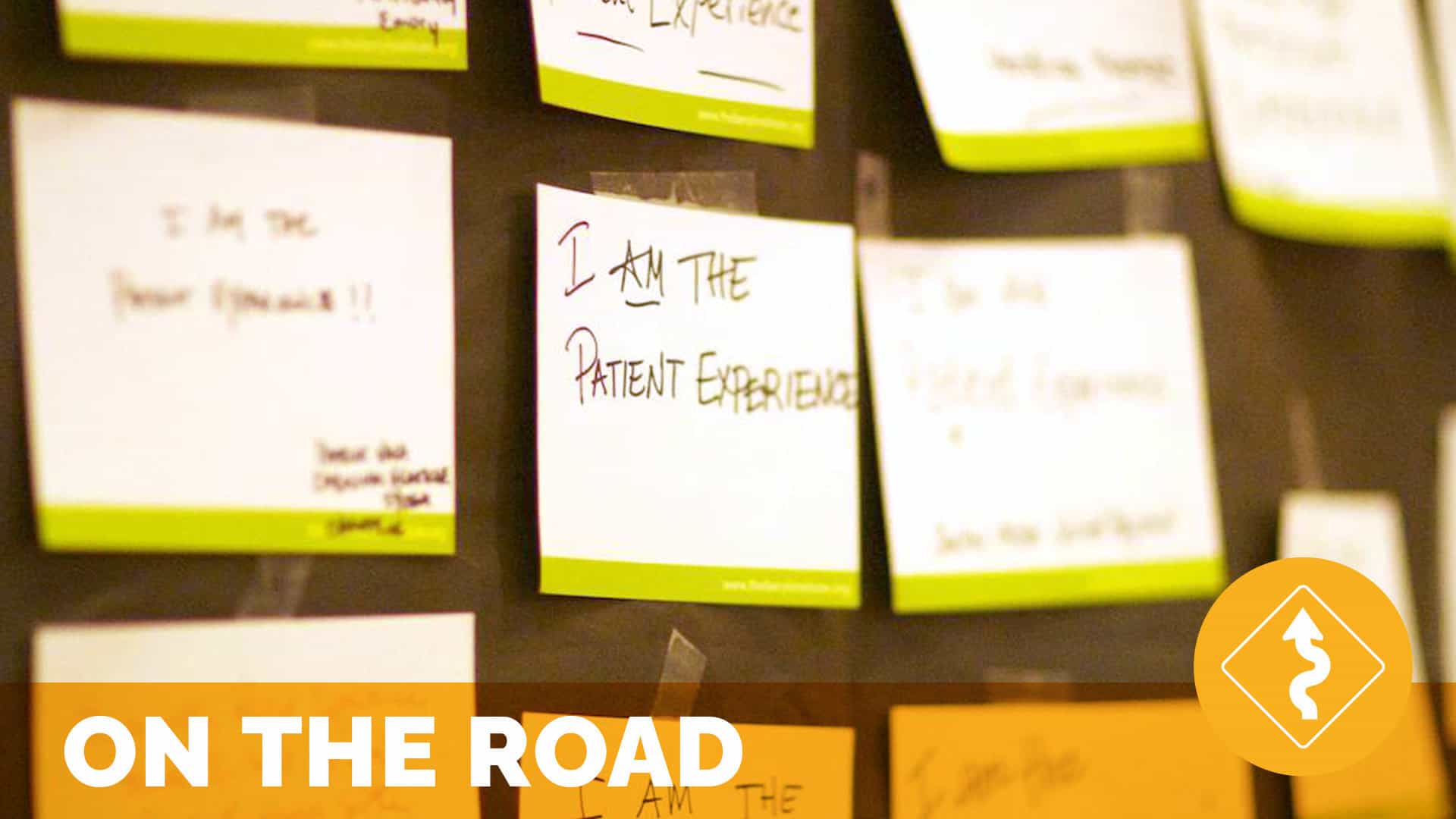The Power of Community

On the Road at Patient Experience Conference 2013 – April 2013
by Jason A. Wolf
At The Beryl Institute one of the first efforts we put in place, in conjunction with framing the definition of patient experience and establishing a patient experience grant program, was our On the Road series. The idea of this effort was to ensure the Institute was not speaking from one narrow perspective or making assertions on practice from an office far from the corridors where care delivery occurs. Rather our intent was, and remains, to walk the floors and halls of hospitals, practices and other healthcare organizations to let their voices of practice shine. Our belief is that we gain the most in learning from the voices of our peers, opening our doors for sharing and being inspired by the opportunity of learning from one another as we all work to improve the patient experience.
This is no better exemplified than in Patient Experience Conference, which as I often say, represents just three days in the 365 that we work to bring the conversation on patient experience improvement to the forefront. Yet these three days encompass all we aspire to be as the global community of practice and premier thought leader on improving patient experience. At the core of our existence at The Beryl Institute is one simple, yet powerful word – Community. It is in community that we learn and grow, it is among community that we can support all we look to achieve and it is through community that we can build a movement for patients and families, those we serve and caregivers in all roles who deliver on our promises every day.
Patient Experience Conference, the annual global gathering of individuals committed to improving patient experience, embodies this very notion. It is designed to bring together all the elements central to what we see as critical to improving patient experience – sharing proven learning, exposure to cutting-edge resources, and creating lasting connections.
IMPX CardsPatient Experience (PX) Conference 2013 provided just that. Almost 550 individuals from 10 countries and 41 states participated. The participants were people who represented caregivers and nurses, physicians and support staff, patients and families, resource providers and others. The conference, more a community gathering than a passive learning event, opened by asking the critical question of our participants – “Why are you the Patient Experience?” The opening video brought home the message that we all choose this work for a reason. Our actions are about the choices each of us make every day in our professional or care settings to ensure the best in experience for those in our care.
PX Conference 2013 was comprised of two pre-conference sessions from industry thought leaders Wendy Leebov, Jill Golde and Dorothy Sisneros and Colleen Sweeney. The conference was shaped by four powerful keynote sessions from the executive perspectives in practice with Roberta Schwartz from The Methodist Hospital System and Britt Berrett and Paul Spiegelman, healthcare executives and co-authors of the New York Times Best Seller, Patients Come Second, from Bryan Williams on the truths in customer service and from Kathie Torpie on the ever important patient perspective. These keynotes were bolstered by a powerful community dialogue in which action items were collected and suggestions for the future of the patient experience movement provided. The conference was filled with an incredible expanse of learning from the front lines of practice with 28 breakout sessions covering the topics of – culture and leadership, employee engagement, physician engagement, patient and family engagement and care experiences, resources and tools. It was framed by a wealth of resource providers committed to supporting patient experience efforts with innovative resources and solutions.
PX Conference 2013This extensive framework of learning opportunities, while significant, was only part of the story – what occurred at Patient Experience Conference 2013 was a true gathering of voices in which people were able to learn from one another. In a healthcare environment where competition for resources and rewards, patients and payments seems to dominate, what clearly rises above all this takes us back to that word – community. People are truly excited to engage with and learn directly from one another, to share ideas in practices to brainstorm on new ways to doing things. It is about the gathering of this community in a shared commitment to improving the patient and family experience that perhaps is the most inspiring component of these three days together. As so many have said to me and my team, as they have in years before – “I now know I am not alone, there is a place I can go to find my peers, to learn and engage, to shamelessly borrow ideas and to give all I can, to support those starting out and nudge along those down the path on this journey.” To me the true power of Patient Experience Conference is what we hope to bring to you via The Beryl Institute all year long – a place for learning, a place for resources and most importantly a place for community in which we all can learn and grow together.
But in so much as I can share perspectives on the event, we asked a few individuals who participated to tell their stories of Patient Experience Conference 2013 – these quick peeks into individual perspective truly represent the power of being On the Road and listening to the voices of the community.
Doug Della Pietra, Director, Customer Services and Volunteers , Rochester General Hospital shared:
The Beryl Institute’s 2013 Patient Experience Conference in Dallas April 17-19th was yet again an amazing experience! Here follow my three key takeaways (riches/nuggets):
Roberta Schwartz – No One Wants a Patient Experience
Opening keynote speaker Roberta Schwartz, executive vice president of The Methodist Hospital in the Texas Medical Center, started with a very memorable, charming and “ah-ha” moment shared by her teenage daughter about the patient experience. While preparing for her keynote address one evening, Roberta’s daughter – puzzled and mystified (as only children can be of their parents) – asked why people would want to listen to her mom speak. Roberta explained that she was going to talk about the patient experience to which her daughter immediately remarked, “No one wants a ‘patient experience!’” That simple and yet profound truth resonated with me throughout the remainder of the conference. As we strive to improve the patient experience how important it is for all of us to remember that no one really wants a “patient experience” – no matter how amazing, exceptional and “world class” it may be.
Bryan Williams – World Class Requires Engagement
Dr. Bryan Williams delivered a very engaging, energy-packed and inspiring keynote address “Delivering World Class Service: What Healthcare Can Learn from Hospitality.” Engagement was the central theme of Williams’ address. First, team members need to be engaged; they need to do more than the “BM” – bare minimum. In other words, our work needs to move from the level of function – tasks – to that of purpose. Yet, “most people never think about the deeper purpose behind their jobs,” Williams reflected. So, we need to help our team members consider the PURPOSE of their ROLE. Team member engagement is absolutely critical and the first step if a hospital wants to become a world class service provider. Why? Because patients and their families want to be engaged at a deeply emotional level. “If you don’t have people who know how to engage your customers,” Williams declared, “nothing else – equipment, the latest technology, a shiny, new lobby – matters!”
Kathie Torpie – Widen Our Focus
Every relationship affects the experience of patients and their families. In her closing keynote address, healthcare speaker and patient Kathie Torpie spoke about the importance of “Widening the Focus” beyond patient-centered care to relationship-centered care. It’s not only what staff say or do in relation to the patient that matters in the overall patient experience; every interaction, every relationship – whether nurse to physician, housekeeper to nurse, social worker to chaplain, family member to case manager, etc. – contributes to the overall experience that patients have with us. We need to widen our focus beyond the silo of my area, my department, my unit, my specialty or my whatever to a systems thinking approach. Everything, everyone is connected. We are all the patient experience.
Nathan DeWitt, Marketing Communications Intern, The Beryl Institute offered:
As an intern at The Beryl Institute and first time Patient Experience Conference attendee in 2013, I never expected to have such a gratifying and meaningful week in Dallas. The fact that such a small team of giants at the Institute put on a conference of that magnitude and importance truly amazed me. Having only been a member of the healthcare and patient experience community for about two months, I simply wanted to ask questions and learn as much as I could from the sponsors and healthcare professionals from around the world. I was blown away by the amount of passion these people have for their jobs.
I am a kidney transplant recipient myself and have been a patient my whole life, but I never considered how the world of healthcare revolved around me. Engaging with some of the 500+ people at the conference opened my eyes to all the helping hands and care that goes into the patient experience, and ensured me that I will always have amazing men and women dedicating their lives to improving the world of healthcare for myself and others alike. My time at the conference reinforced how honored and excited I am to have a chance to help improve the patient experience in healthcare.
Sylvia Hernandez, MSW, Assistant Director, Volunteer and Guest Services, Children’s Mercy Hospitals and Clinics reflected:
My service position at Children’s Mercy Hospitals and Clinics provides me with a fantastic opportunity to care for patients, families and guests in a unique role. I am the Assistant Director of Volunteer and Guest Services under the leadership of our innovative director Stacey Koenig. She is a certified Child Life Specialist and I a Master Social Worker. Many of the areas our section touches are wrapped up in patient experience. In addition to my professional role, I am also an experienced parent in our hospital both inpatient and now outpatient. My daughter is a medulloblastoma survivor, diagnosed at 4.5 and now 9. That being said, it was refreshing to hear the abundant conversation regarding parent/patient involvement when creating programs/services for them. It makes perfect sense. Not just asking their advice, but having them pull up a chair in the planning stages of facilities, messaging, scheduling issues, etc. A key factor, also discussed at the conference, is that of the employee, every employee, being “truly engaged” in being part of the world class experience a family has in their organization, website, to door step to provider and back home again. It was great to have an opportunity to meet so many professionals who have a passion for purposeful service. I only wished I could have brought my whole team. As I mentioned before, our innovative leader, a wonderful partner for patients and families, made great strides in the time she has been here. We have parents on staff, paid staff, representing the parents voice, we have a program supporting volunteers and staff who were patients and are now either volunteers or employees with disabilities, along with Child Life who makes a huge difference and the school teachers, music therapists, along with our stellar volunteers. I wish we could share what we have done. I overheard many who were just starting the journey of “how to” bring parents and/or patients on board, however, I know our 3 advisory councils are strong and have provided guidance in many aspects of our hospital.
I would have to say every keynote speaker taught me something, each were dynamic and unique and had something to share that I brought home with me. I do have to say, due to the Guest Services aspect of my position, Bryan Williams truly stuck out in my mind. As a parent, it was good to hear someone just say it – go for world class. The new attendee welcome was also very helpful. I also made great friends that made an impact in the work I will do in the future. I know I can call on them, seriously, anytime for advice. I LOVE THAT!
PX Conference 2013There were over 500 voices like this and with the power of each individual experience, what I was amazed by was the commitment each of these individual voices had for the community itself. I hope you too will share your story about the value you either saw in Patient Experience Conference or in being part of the patient experience dialogue each and every day! There is a true and growing realization that a patient experience movement is afoot and the participants at Patient Experience Conference, the members and guests of The Beryl Institute, are right at the center of the action.
Mary Ann Perez from St. Jude Medical Center shared the spirit of community in commenting, “I love that The Beryl Institute is a LEARNING community of professionals who are willing to share with each other and learn from one another. Although some of us may be “competing” health systems, we are able to put those issues aside for the good of our patients. I really appreciate the camaraderie.”
Lynette Gutnik, Director Service Excellence at Sutter Health – Sutter Medical Foundation reinforced, “We are part of the patient experience movement and we are all in this together. IMPX…loved it. This conference has given me a real sense of belonging with like people all working to achieve an improved patient experience. Thank you!”
As I started out this On the Road, I shared that in our voices we have great power, in our personal learning we have great opportunity and as we bring these together via our work at The Beryl Institute I hope we can continue to fan the flames of urgency and effort on improving the patient and family experience around the world.
As we brought the conference to a close I read a poem from Maya Angelou entitled “I’ve Learned”:
I’ve learned that no matter what happens, or how bad it seems today, life does go on, and it will be better tomorrow.
I’ve learned that you can tell a lot about a person by the way he/she handles these three things: a rainy day, lost luggage, and tangled Christmas tree lights.
I’ve learned that regardless of your relationship with your parents, you’ll miss them when they’re gone from your life.
I’ve learned that making a ‘living’ is not the same thing as ‘making a life’.
I’ve learned that life sometimes gives you a second chance.
I’ve learned that you shouldn’t go through life with a catcher’s mitt on both hands; you need to be able to throw some things back.
I’ve learned that whenever I decide something with an open heart, I usually make the right decision.
I’ve learned that even when I have pains, I don’t have to be one.
I’ve learned that every day you should reach out and touch someone. People love a warm hug, or just a friendly pat on the back.
I’ve learned that I still have a lot to learn.
I’ve learned that people will forget what you said, people will forget what you did, but people will never forget how you made them feel.
That is and will continue to be our purpose at The Beryl Institute to ensure for all we say and do, you also remember how we made you feel…as we work to provide learning, resources and community, it is the power of all who comprise our community, the voices each of you reading this represent that makes all we do possible.
In closing the conference I offered three more hopes:
I hope we’ve learned how powerful a gathering like this can be in making a difference in the lives of the patients, families and communities we serve.
I hope we’ve learned how important it is that we continue with unwavering commitment our willingness to learn from one another.
I hope we’ve learned the magic each of you bring to our movement, to improving the patient experience and that helps me know that all is truly right and good.
Now lets go forth in our commitment to ensure the greatest in experience for all we encounter…safe travels and see you soon!
I wish the same for you all…knowing that on this patient experience journey, you are not alone, you have a family, friends, a community to support you. Here is to the next 365 days and beyond in our movement to improve the patient experience.
Author’s Note:
Those of you in attendance heard that as I shared my last words Friday afternoon, I rushed off to the airport, caught the next possible flight to Washington, DC to meet my wife, headed to the hospital and welcomed my new son to the world on Saturday Morning, April 20th at 6:18 a.m. First, thanks to so many of you for the well wishes. More importantly, having left a gathering such as Patient Experience Conference to be a patient/family member admitted for two days immediately to follow reinforces perhaps the most important learning for me all week – that the patient experience is delivered by and for all of us each and every day; for our spouses and partners, our children and our parents. To experience Patient Experience Conference and then see our movement at work those next two days made me realize we are truly on the right track, for the right cause…we are all truly the patient experience. And I am extremely thankful for that!
Related content
-
 Patient Family & Community Engagement
Patient Family & Community EngagementModeling Mutual Respect in Healthcare
By Kathy Saldana, MA, CPXP Imagine you have an interview for a job you really need. In fact, you won’t be able to pay your bills if you don’t get this job. Before entering the interview, you send a note to the interviewer that reads, “I have zero tolerance for disrespect. You will be removed
Learn more -
 Culture & Leadership
Culture & LeadershipBuilding the Ultimate Patient Experience Strategy: Lessons from an Iconic Burger
By Lanie L. Dixon and Cassie Voltzke When you think of an iconic burger, what stands out? The unique toppings—melty cheeses, tangy spreads, crisp vegetables, or bold condiments—make it memorable. Yet, the heart of any great burger lies in its fundamentals: the bun and the meat. Without these foundational elements, the toppings wouldn’t have anything
Learn more -
 Culture & Leadership | Patient Family & Community Engagement | Quality & Clinical Excellence | Staff & Provider Engagement
Culture & Leadership | Patient Family & Community Engagement | Quality & Clinical Excellence | Staff & Provider EngagementPX Chat – Leading with Equity: DEI & the Patient Experience in Today’s Climate
12pm ET / 11am CT / 10am MT / 9am PT – In a time of heightened political and cultural tension, advancing diversity, equity, and inclusion (DEI) in healthcare is both more critical and more complex than ever. This PX Chat offers a dedicated space for members of The Beryl Institute focused on DEI efforts
Learn more
